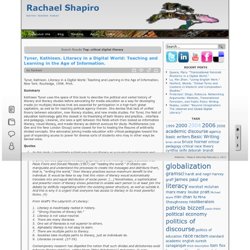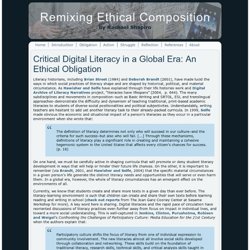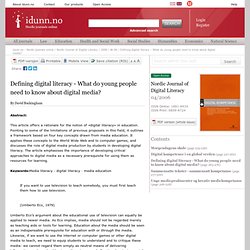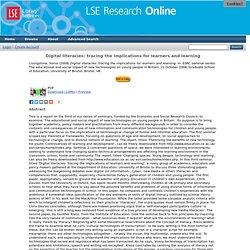

Critical digital literacy « Rachael Shapiro. Tyner, Kathleen.

Literacy in a Digital World: Teaching and Learning in the Age of Information. New York: Routledge, 1998. Print. Kathleen Tyner uses the space of this book to describe the political and varied history of literacy and literacy studies before advocating for media education as a way for developing media (or multiple) literacies that are essential for participation in a high-tech global capitalism, as well as for reaching political agency therein.
She decries that lack of unified theory between education, new literacy studies, and new media studies. In this book, I investigate a third way to use literacy as a source of social power and that is the ability to decode information in a variety of forms, analogous to the reading of print, but also applicable to audio, graphics, and the moving image, a process that Paolo Freire and Donald Macedo (1987) call “reading the world.” From Graff’s : Literacy is inextricably rooted in history. Critical Digital Literacy in a Global Era: An Ethical Obligation. Literacy historians, including Brian Street (1984) and Deborah Brandt (2001), have made lucid the ways in which social practices of literacy shape and are shaped by historical, political, and material circumstance.

As Hawisher and Selfe have explained through their life histories work and Digital Archive of Literacy Narratives project, “literacies have lifespans” (2004, p. 644). The many subdisciplines and movements in composition–such as Basic Writing and SRTOL, ESL and translingual approaches–demonstrate the difficulty and dynamism of teaching traditional, print-based academic literacies to students of diverse social positionalities and political subjectivites.
Understandably, writing teachers are hesitant to add yet another literacy task to their already-packed curricula. In 1999, Selfe made obvious the economic and situational impact of a person’s literacies as they occur in a particular environment when she wrote that: This is no overstatement. All available means. Digital Literacy in the Google Generation. Critical digital literacy. Confronting the Challenges of Critical Digital Literacy: An Essay Review Critical Constructivism: A Primer - Educational Studies - Volume 43, Issue 3. Principes fondamentaux de la littératie numérique et de l'éducation aux médias. MediaSmarts. Defining digital literacy - What do young people need to know about digital media? - Digital kompetanse Nr 04 - 2006 - Nr 04 - 2006 - Nordic Journal of Digital Literacy - tidsskrifter - idunn.no - tidsskrifter på nett.
Abstract: This article offers a rationale for the notion of «digital literacy» in education.

Pointing to some of the limitations of previous proposals in this field, it outlines a framework based on four key concepts drawn from media education. It applies these concepts to the World Wide Web and to computer games, and discusses the role of digital media production by students in developing digital literacy. The article emphasises the importance of developing critical approaches to digital media as a necessary prerequisite for using them as resources for learning.
Keywords:Media literacy · digital literacy · media education If you want to use television to teach somebody, you must first teach them how to use television. (Umberto Eco, 1979) Umberto Eco’s argument about the educational use of television can equally be applied to newer media. My aim in this article is to identify some of the forms that this education might take, and some of the questions that it might raise.
Page: 264. Framework for 21st Century Learning. K12 Education Technology - Page 3. Digital literacies: tracing the implications for learners and learning. Livingstone, Sonia (2008) Digital literacies: tracing the implications for learners and learning.

In: ESRC seminar series: The educational and social impact of new technologies on young people in Britain, 21 October 2008, Graduate School of Education, University of Bristol, Bristol, UK. This is a report on the third of our series of seminars, funded by the Economic and Social Research Council, to examine ‘The educational and social impact of new technologies on young people in Britain’.
Its purpose is to bring together academics, policy makers and practitioners from many different backgrounds in order to consider the contexts and consequences of use of new information and communication technologies for children and young people, with a particular focus on the implications of technological change of formal and informal education.
New Media Literacies. Web.mit.edu/comm-forum/mit6/papers/Carlacio.pdf.